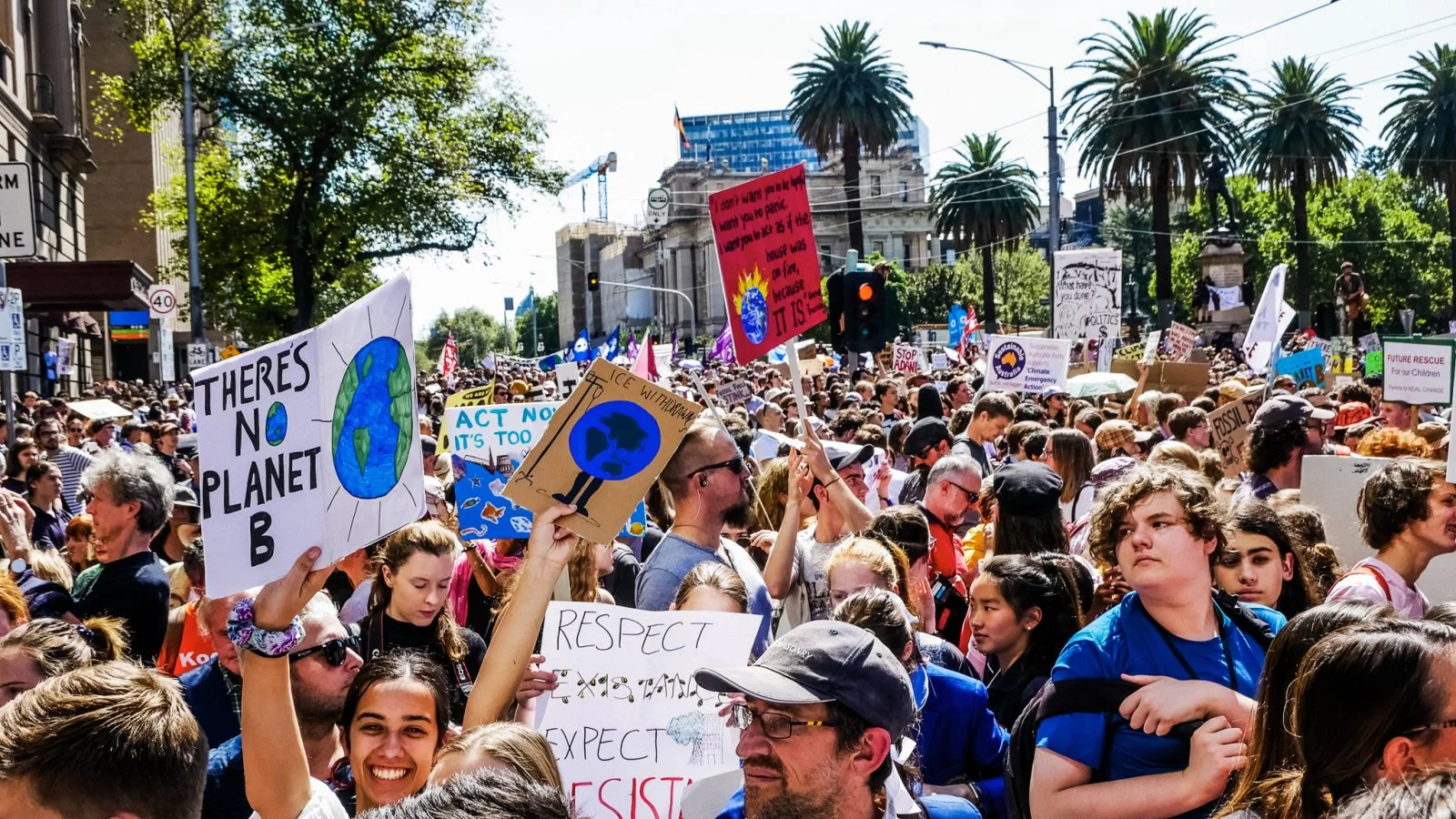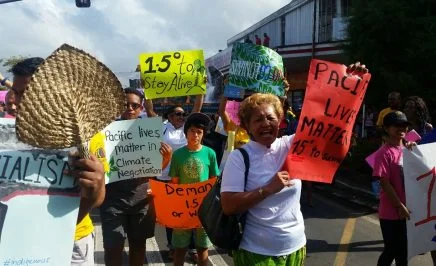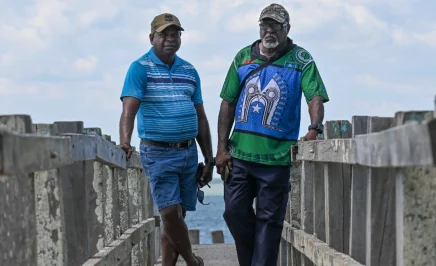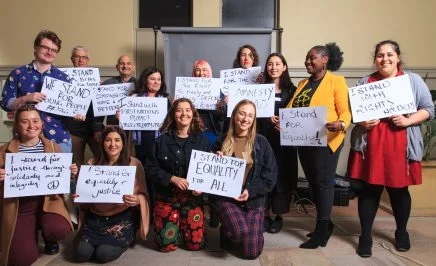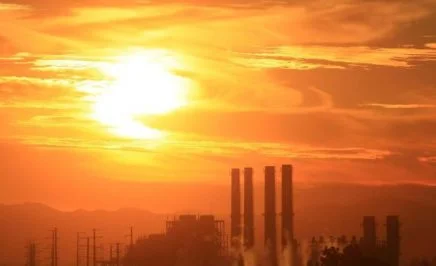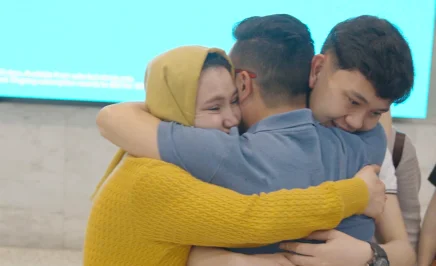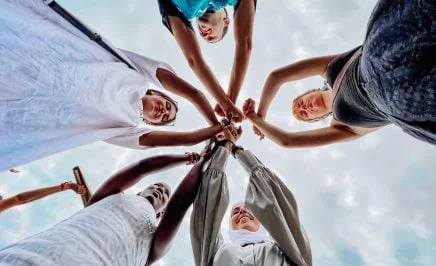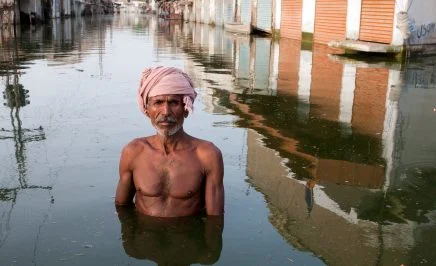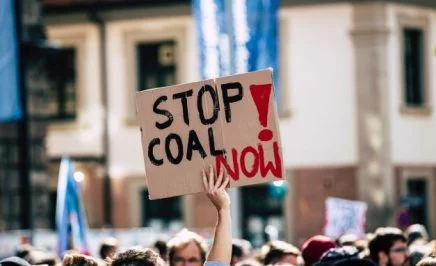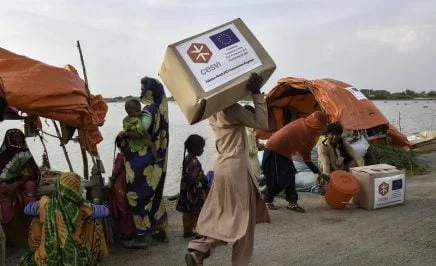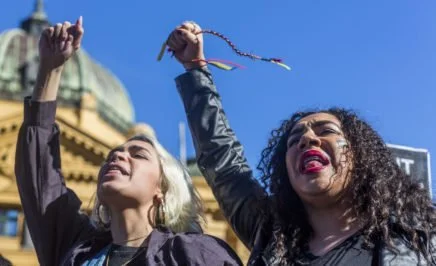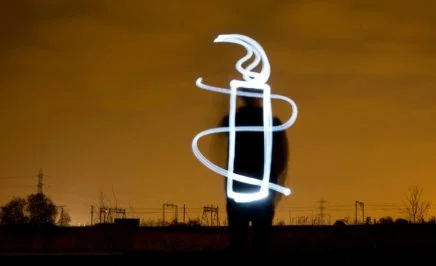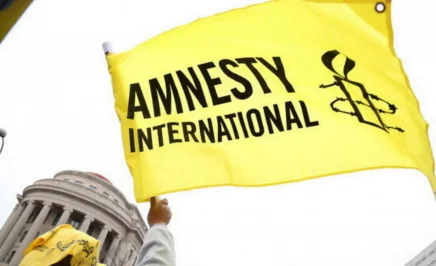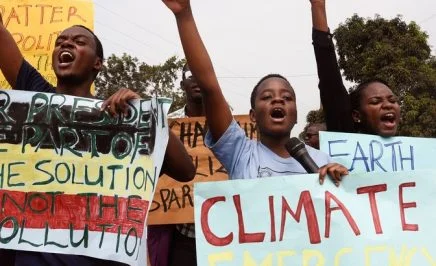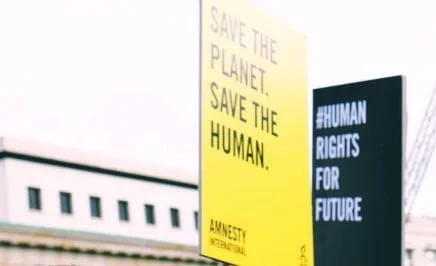In brief
Extreme weather-related disasters and rising seas will destroy homes and ruin people’s ability to earn a living. Unless emissions are reduced significantly, around 600 million people are likely to experience drought and famine as a result of climate change. So you can see there’s a direct link between climate change and human rights, including the rights to life, health, food, water and housing.
Read more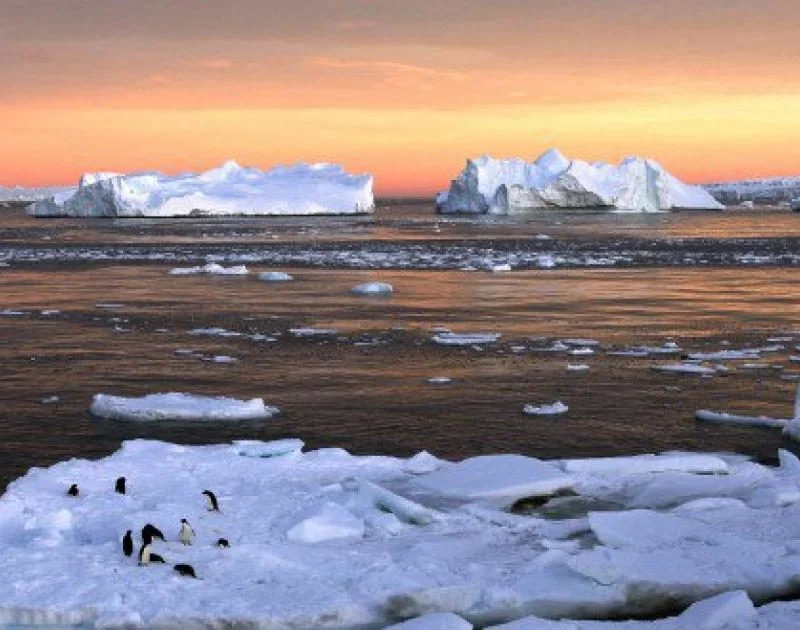
The issue in depth
The planet’s climate has constantly been changing over geological time, with significant fluctuations of global average temperatures.
However, this current period of warming is occurring more rapidly than any past events. It has become clear that humanity has caused most of the last century’s warming by releasing heat-trapping gases—commonly referred to as greenhouse gases—to power our modern lives. We are doing this through burning fossil fuels, agriculture and land-use and other activities that drive climate change. Greenhouse gases are at the highest levels they have ever been over the last 800,000 years. This rapid rise is a problem because it’s changing our climate at a rate that is too fast for living things to adapt to.
Climate change involves not only rising temperatures, but also extreme weather events, rising sea levels, shifting wildlife populations and habitats, and a range of other impacts. There is an overwhelming scientific consensus that global warming is mostly man-made: 97% of climate scientists have come to this conclusion.
The effects of climate change are already being felt now, but they will get worse. Global warming has reached approximately 1°C above pre-industrial levels. Every half degree (or even less) of global warming counts.
It is important to remember that no one list of the effects of climate change can be exhaustive. It is very likely that heatwaves will occur more often and last longer, and that extreme precipitation events will become more intense and frequent in many regions. The oceans will continue to warm and acidify, and global mean sea level will continue to rise. All of this will have, and is already starting to have a devastating impact on human life.
The urgent need to address climate change has become even clearer with the release of a major report in October 2018 by the world’s leading scientific body for the assessment of climate change, the Intergovernmental Panel on Climate Change (IPCC). The IPCC warns that in order to avoid catastrophic global warming, we must not reach 1.5°C above pre-industrial levels – or at the very minimum not exceed that. The report sets out the massive differences between the 1.5°C and 2°C scenarios.
By working to limit the increase in average global average temperatures to 1.5°C, the IPCC states that we could for example:
- reduce the number of people both exposed to climate-related risks and susceptible to poverty by up to several hundred million by 2050;
- protect 10 million people from risks related to sea levels;
- reduce the proportion of the global population exposed to increase in water stress by up to 50%, or one in every 25 people on this planet.
Perhaps most importantly, the IPCC report gave the world a clear deadline to avoid catastrophe: greenhouse gas emissions must be halved from their 2010 levels by 2030 to avoid reaching 1.5°C. Our governments must therefore take immediate steps right now to change course. The longer we take to do this, the more we will have to rely on costly technologies that could have harmful impacts on human rights.
Close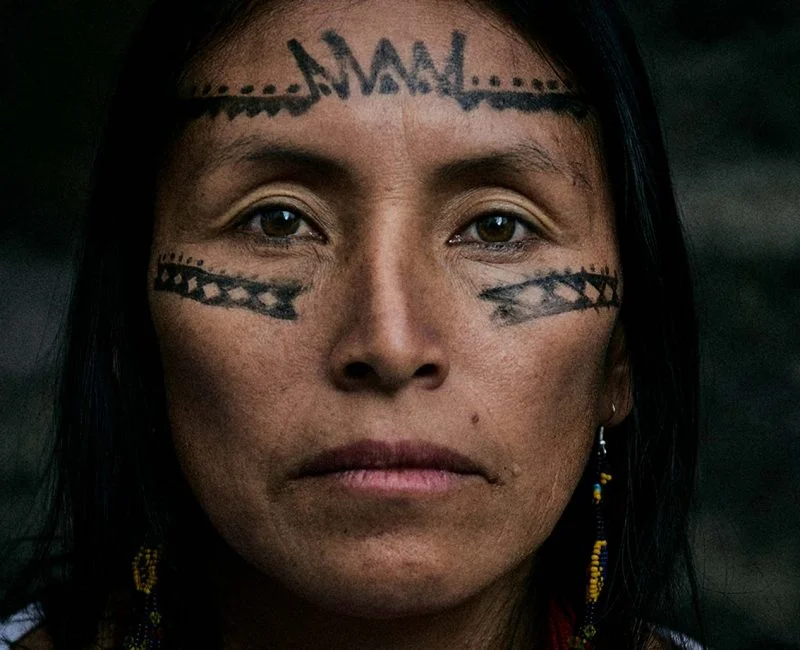
Why is climate change a human rights issue?
Human rights are intimately linked with climate change because of its devastating effect on not just the environment, but our own wellbeing. In addition to threatening our very existence, climate change is having harmful impacts on our rights to life, health, food, water, housing and livelihoods.
The longer governments wait to take meaningful action, the harder the problem becomes to solve, and the greater the risk that emissions will be reduced through means that increase inequality rather than reduce it.
These are some of the ways climate change impacts our human rights:
Right to life
We all have the right to life, and to live in freedom and safety. But climate change threatens the safety of billions of people on this planet. The most obvious example is through extreme weather-related events, such as storms, floods and wildfires. Typhoon Yolanda in the Philippines claimed the lives of nearly 10,000 people in 2013. Heat stress is among the most deadly impacts. The summer heatwave in Europe in 2003 resulted in the deaths of 35,000 people. However, there are many other less visible ways that climate change threatens lives. The World Health Organization predicts that climate change will cause 250,000 deaths per year between 2030 and 2050, due to malaria, malnutrition, diarrhoea and heat stress.
Right to health
We all have the right to enjoy the highest attainable standard of physical and mental health. According to the IPCC, the major health impacts of climate change will include greater risk of injury, disease and death due to more intense heat waves and fires; increased risk of under-nutrition as a result of diminished food production in poor regions; and increased risks of food- and water-borne diseases, and vector-borne diseases. Children exposed to traumatic events such as natural disasters, exacerbated by climate change, can suffer from post-traumatic stress disorders. The health impacts of climate change demand an urgent response, with unmitigated warming threatening to undermine health systems and core global health objectives.
Right to housing
We all have a right to an adequate standard of living for ourselves and our families, including adequate housing. However, climate change threatens our right to housing in a variety of ways. Extreme weather events like floods and wildfires are already destroying people’s homes, leaving them displaced. Drought, erosion and flooding can also over time change the environment whilst sea-level rises threaten the homes of millions of people around the world in low-lying territories.
Rights to water and sanitation
We all have the right to safe water for personal and domestic use and sanitation that ensures we stay healthy. But a combination of factors such as melting snow and ice, reduced rainfall, higher temperatures and rising sea levels show that climate change is affecting and will continue to affect the quality and quantity of water resources. Already more than one billion people do not have access to clean water, and climate change will make this worse. Extreme weather events such as cyclones and floods affect water and sanitation infrastructure, leaving behind contaminated water and thus contributing to the spread of water-borne diseases. Sewage systems, especially in urban areas, will also be affected.
According to Amnesty International Australia’s Human Rights Barometer 2021:
- Climate change affects our children of today. 85% of Australians identified the rights of children as important to them personally, or as of importance for others. This reflects an onus on Australians to safeguard the fundamental rights of future generations.
- Climate change affects our right to work. The right to work is important to 73% of Australians. Yet, around 40% of world employment is reliant on industries which are susceptible to environmental degradation and climate change.
- Young people care for climate justice. Majority of young Australians believe climate change is the most important issue facing the global community.
Who is impacted the most by climate change?
Climate change is and will continue to harm all of us unless governments take action. However, its effects are likely to be much more pronounced for certain groups – for example, those communities dependent on agricultural or coastal livelihoods – as well as those who are generally already vulnerable, disadvantaged and subject to discrimination.
Read More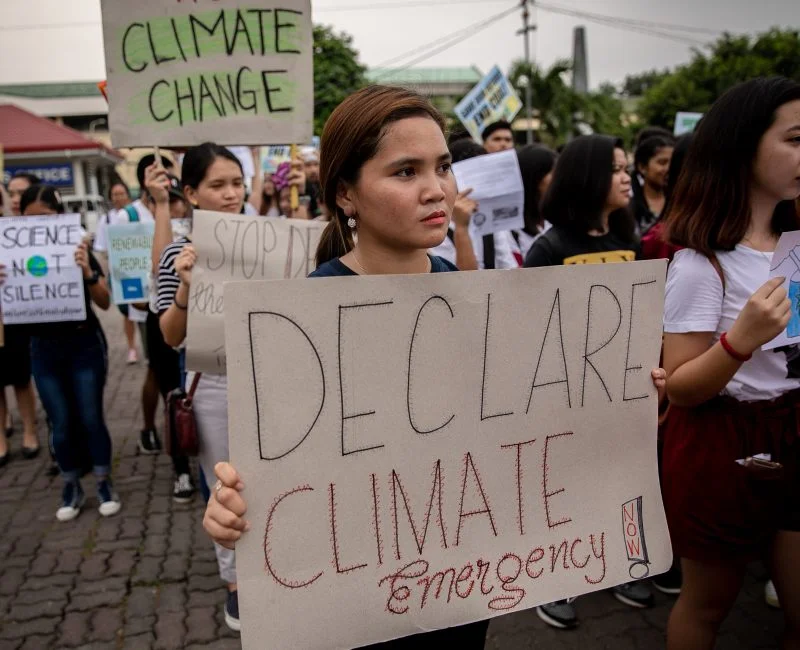
These are some of the ways climate change exacerbates inequalities:
Between developed and developing nations:
At a national level, those in low-lying, small island states and less developed countries will be and already are among those worst affected. People in the Marshall Islands already regularly experience the devastating flooding and storms that destroy their homes and livelihoods. The 2018 heatwave in the northern hemisphere made headlines across Europe and North America, but some of the worst effects were also felt in places like Pakistan, where more than 60 people died – mostly labourers already working in intense heat – as temperatures soared above 44°C.
Between different ethnicities and classes:
The effects of climate change and fossil fuel-related pollution also run along ethnicity and class lines. In North America, it is largely poorer communities of colour who are forced to breathe toxic air because their neighbourhoods are more likely to be situated next to power plants and refineries. They experience markedly higher rates of respiratory illnesses and cancers, and African Americans are three times more likely to die of airborne pollution than the overall US population.
Between genders:
Women and girls are disproportionately affected by climate change, reflecting the fact that they are more likely in many countries to be marginalized and disadvantaged. This means that they are more vulnerable to the impacts of climate-related events as they are less able to protect themselves against it and will find it harder to recover.
Between generations:
Future generations will experience the worsening effects unless action is taken now by governments. However, children and young people are already suffering due to their specific metabolism, physiology and developmental needs. This means, for example, that the forced displacement experienced by communities impacting a whole range of rights – from water, sanitation and food to adequate housing, health, education and development – is likely to be particularly harmful to children.
Between communities:
Indigenous peoples are among the communities most impacted by climate change. They often live in marginal lands and fragile ecosystems which are particularly sensitive to alterations in the physical environment. They maintain a close connection with nature and their traditional lands on which their livelihoods and cultural identity depend.
Close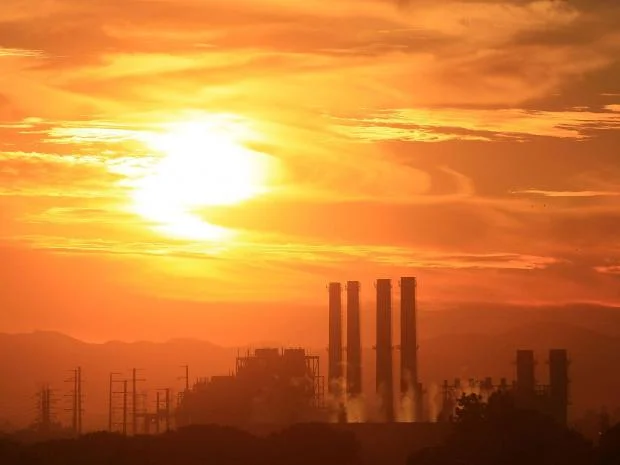
Who is responsible?
Together with partners, we’re pressing governments and institutions like the UN to take concrete and urgent actions on climate change. This isn’t about charity or aid, it’s about human rights and justice.
Read MoreGovernments
States have the obligation to mitigate the harmful effects of climate change by taking the most ambitious measures possible to prevent or reduce greenhouse emissions within the shortest possible time-frame. While wealthy states need to lead the way, both internally and through international cooperation, all countries must take all reasonable steps to reduce emissions to the full extent of their abilities.
States must also take all necessary steps to help everyone within their jurisdiction to adapt to the foreseeable and unavoidable effects of climate change, thus minimizing the impact of climate change on their human rights. This is true irrespective of whether the state is responsible for those effects, because states have an obligation to protect people from harm caused by third parties.
States must take steps to tackle climate change as fast and as humanely as possible. In their efforts to address climate change, they must not resort to measures that directly or indirectly violate human rights. For example, conservation areas or renewable energy projects must not be created on the lands of Indigenous peoples without consulting them and getting their consent.
In all measures, states should respect the right to information and participation for all affected people, as well as their right to access effective remedies for human rights abuses.
However, the current pledges made by governments to mitigate climate change are completely inadequate, as they would lead to a catastrophic 3°C increase in average global temperatures over pre-industrial levels by 2100. People in countries including France, the Netherlands and Switzerland are taking their governments to court for their failure to establish sufficient climate mitigation targets and measures.
Corporations
Businesses also have a responsibility to respect human rights. To meet this responsibility, companies must assess the potential effects of their activities on human rights and put in place measures to prevent negative impacts. They must make such findings and any prevention measures public. Companies must also take measures to remedy human rights abuses they cause or to which they contribute, either by themselves or in cooperation with other actors. Such responsibilities extend to human rights harms resulting from climate change.
Corporations, and particularly fossil fuel companies, must also immediately put measures in place to minimize greenhouse emissions – including by shifting their portfolio towards renewable energy – and make relevant information about their emissions and mitigation efforts public. These efforts must extend to all the major subsidiaries, affiliates and entities in their supply chain.
Fossil fuel companies have been historically among the most responsible for climate change – and this continues today. Research shows that just 100 fossil fuel-producing companies are responsible for 71% of global greenhouse gas emissions since 1988.
There is growing evidence that major fossil fuel companies have known for decades about the harmful effects of burning fossil fuels and have attempted to suppress that information and block efforts to tackle climate change.
CloseWhat we’re asking
Governments must do all they can to reduce carbon emissions, including phasing out subsidies for fossil fuels. They must also help people adapt to climate change, and provide compensation, for example to those who have lost their homes because of rising sea levels.
Read More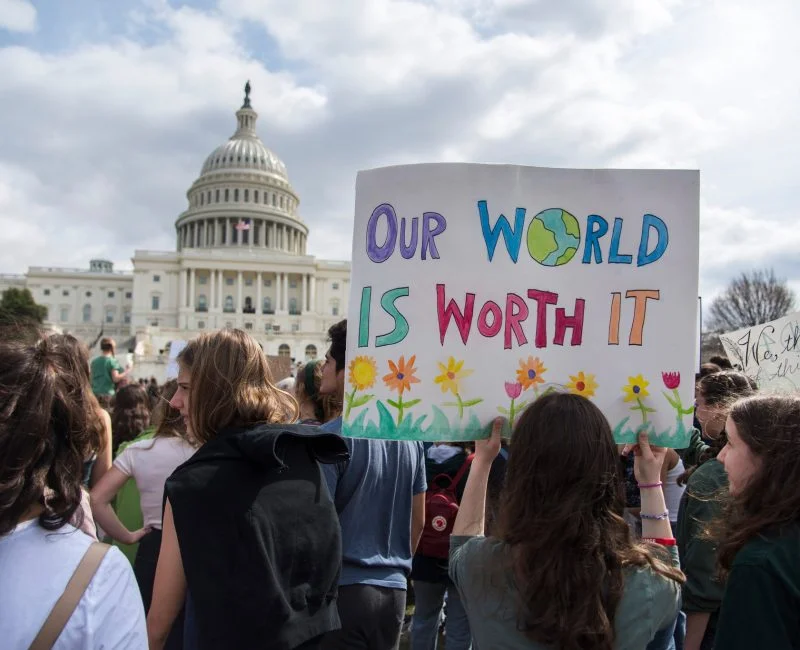
We are calling on governments to:
- Do everything they can to help stop the global temperature rising by more than 1.5°C
- Reduce their greenhouse gas emissions to zero by 2050 at the latest. Richer countries should do this faster. By 2030, global emissions must be half as much as they were in 2010
- Stop using fossil fuels (coal, oil and gas) as quickly as possible
- Make sure that climate action is done in a way that does not violate anyone’s human rights, and reduces rather than increases inequality
- Make sure everyone, particularly those affected by climate change or the transition to a fossil-free economy, is properly informed about what is happening and is able to participate in decisions about their futures
Take Action Now
Our Wins

